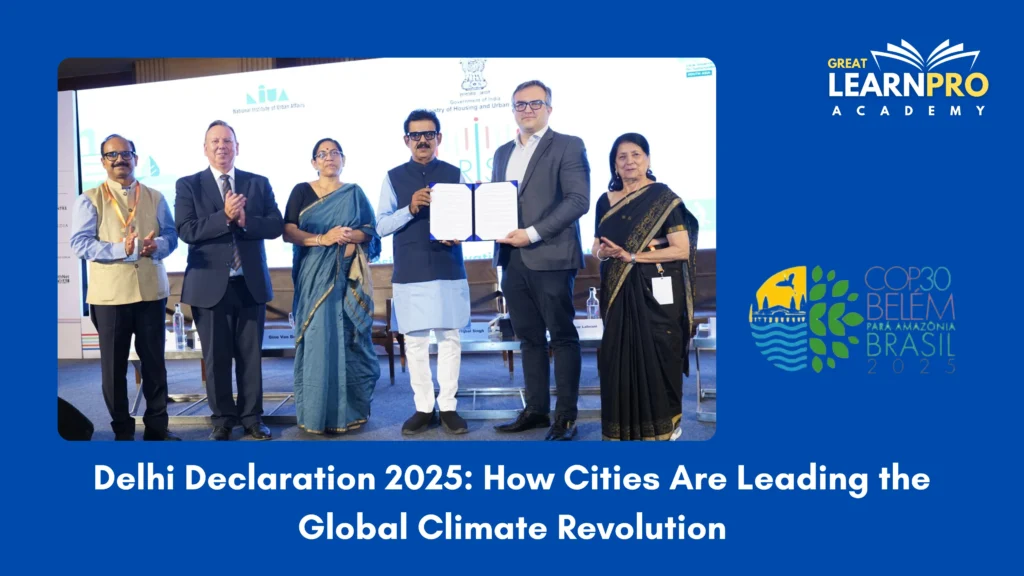In October 2025, the “Delhi Declaration on Local Action for Global Climate Goals” emerged as a landmark commitment that places cities at the heart of global climate action. Adopted at the first ARISE Cities Forum 2025 in New Delhi on 8–9 October, the declaration was co-hosted by ICLEI South Asia and the National Institute of Urban Affairs (NIUA). More than 200 delegates from over 60 cities across 25 countries representing local and national governments, the private sector, and civil society came together to affirm a collective vision for climate-resilient urban futures. The declaration aims to carry the “spirit of cities” to COP30 and beyond, highlighting the essential role of urban centres in achieving the Paris Agreement goals.

Urban areas today are at the core of both the problem and the solution to climate change. Cities account for nearly three-quarters of global carbon emissions and are the most vulnerable to rising temperatures, floods, and resource stress. The Global South, in particular, faces a dual challenge rapid urbanisation and limited infrastructure capacity. The Delhi Declaration 2025 acknowledges these realities and establishes that local governments must be active partners, not just implementers, in national and international climate frameworks.
At its core, the Delhi Declaration is a call for multilevel climate governance that integrates cities as pivotal actors. It lays out several key commitments for local and sub-national governments, especially in developing nations. These include strengthening measurable and well-financed Nationally Determined Contributions (NDCs) that formally recognise the role of local authorities; promoting inclusive urban resilience through circular economy models and nature-based solutions; advancing just and equitable green transitions; empowering citizens, women, and youth in decision-making; and ensuring transparent governance and accessible data systems for accountability.
Another major focus of the declaration is climate finance. It emphasises the urgent need for direct financial access to cities, which often struggle with inadequate funding and bureaucratic hurdles. The document advocates for greater South-South and triangular cooperation, where cities in the Global South can exchange strategies and innovations without overreliance on northern models. This represents a shift in the global dialogue — moving from a top-down model of climate policy to one that values local leadership and context-specific action.
For India, the host nation, the Delhi Declaration complements its ongoing urban and environmental missions. Initiatives like the Smart Cities Mission, AMRUT 2.0, and the National Mission on Sustainable Habitat already aim to make Indian cities more sustainable, energy-efficient, and resilient. By linking these national programmes with global climate goals, India is positioning its cities as laboratories for innovation and climate action. The declaration thus bridges local realities with global commitments, aligning urban development with sustainability and inclusivity.
The declaration also pushes forward the principle of “just transition” — ensuring that the shift to low-carbon economies does not leave behind vulnerable communities, informal workers, or marginalised populations. It calls for participatory governance, where climate strategies are co-created with citizens rather than imposed from above. This approach not only enhances social equity but also strengthens the legitimacy and effectiveness of climate action.
However, translating these aspirations into reality poses significant challenges. Many cities lack the institutional capacity, financial resources, or technical expertise to execute large-scale climate projects. The integration of local plans into national frameworks requires systemic reforms and clearer mandates. Climate finance, while heavily discussed, remains unevenly distributed, and most urban administrations still depend on central or international intermediaries for access. Without decentralised financing and robust accountability mechanisms, the vision of the Delhi Declaration could remain largely aspirational.
Data and transparency also present hurdles. Effective local climate action demands strong monitoring, reporting, and verification systems to measure progress accurately. Many cities, especially smaller or mid-tier ones, lack the infrastructure to collect or analyse such data. This gap can hinder global recognition of their efforts and weaken collective climate reporting mechanisms under the Paris Agreement.
Despite these challenges, the Delhi Declaration 2025 stands as a milestone in reimagining the architecture of global climate governance. By giving cities a seat at the table, it recognises that real change begins at the local level where people live, work, and experience the impact of climate change firsthand. The declaration signals a paradigm shift: from abstract international pledges to concrete urban action, from national dominance to local empowerment, and from isolated efforts to coordinated global solidarity.
As the declaration moves “from Bharat to Belém” from India to Brazil, where COP30 will convene it carries with it a strong message: that sustainable, resilient, and inclusive cities are the foundation of a stable planet. The Delhi Declaration 2025 is not merely a policy document; it is a vision of a future where cities lead the climate revolution, shaping a world that is greener, fairer, and more united in purpose.
Sources:
More Current affairs: https://learnproacademy.in/updates/
